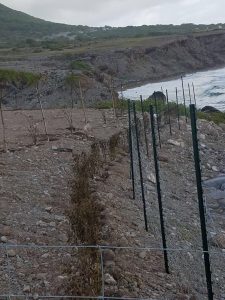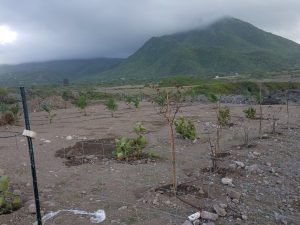Charlestown, Nevis (14/06/2017): Project Manager of Lefco Equipment Rental and Construction Company Ltd. Mr. Oswald Wilfred, has reported that 80 percent of the GCCA-funded New River/Coconut Walk Estate Slope Stabilization and Erosion Control Measures project in Nevis has been completed to date.
“The project seeks to address the shoreline erosion and land degradation along the coast of New River and Coconut Walk Estate. This [shoreline erosion] will result in losing the existing kiln,” Wilfred stated.

“The project consists of two sections/phases Lot 1 and Lot 2. The first phase “Lot 1” is a revetment which is the placement or packing of Toe Stones and Armour Stones or Boulders approximately 65m in length along the shoreline behind the existing kiln to prevent erosion from continuous wave action in this area. This phase of the project is for a duration of six (6) months. The other aspect of the project is “Lot 2” which is planting of sea tolerant vegetation behind the revetment on either side of the existing kiln to prevent further erosion and to enhance the area. This phase is for a duration of one (1) year and six (6) months allocated for planting and the remaining six (6) months for monitoring of the plants,” Wilfred further explained.

The project is expected to be completed within a few months.
“Work has been progressing fairly well. We are into the fourth month of phase one and thus far eighty percent (80%) of the revetment is already completed. We are looking to complete the revetment section at the end of the moth. And also commencement of the second phase within the last week has begun,” said Wilfred.
The Project is a collaboration between the OECS Commission, the Global Climate Change Alliance (GCCA) and the European Union. Its main objectives are to build awareness of Global Climate Change as well as to increase the capacity of Member States to tackle the effects of climate change in their territories.
